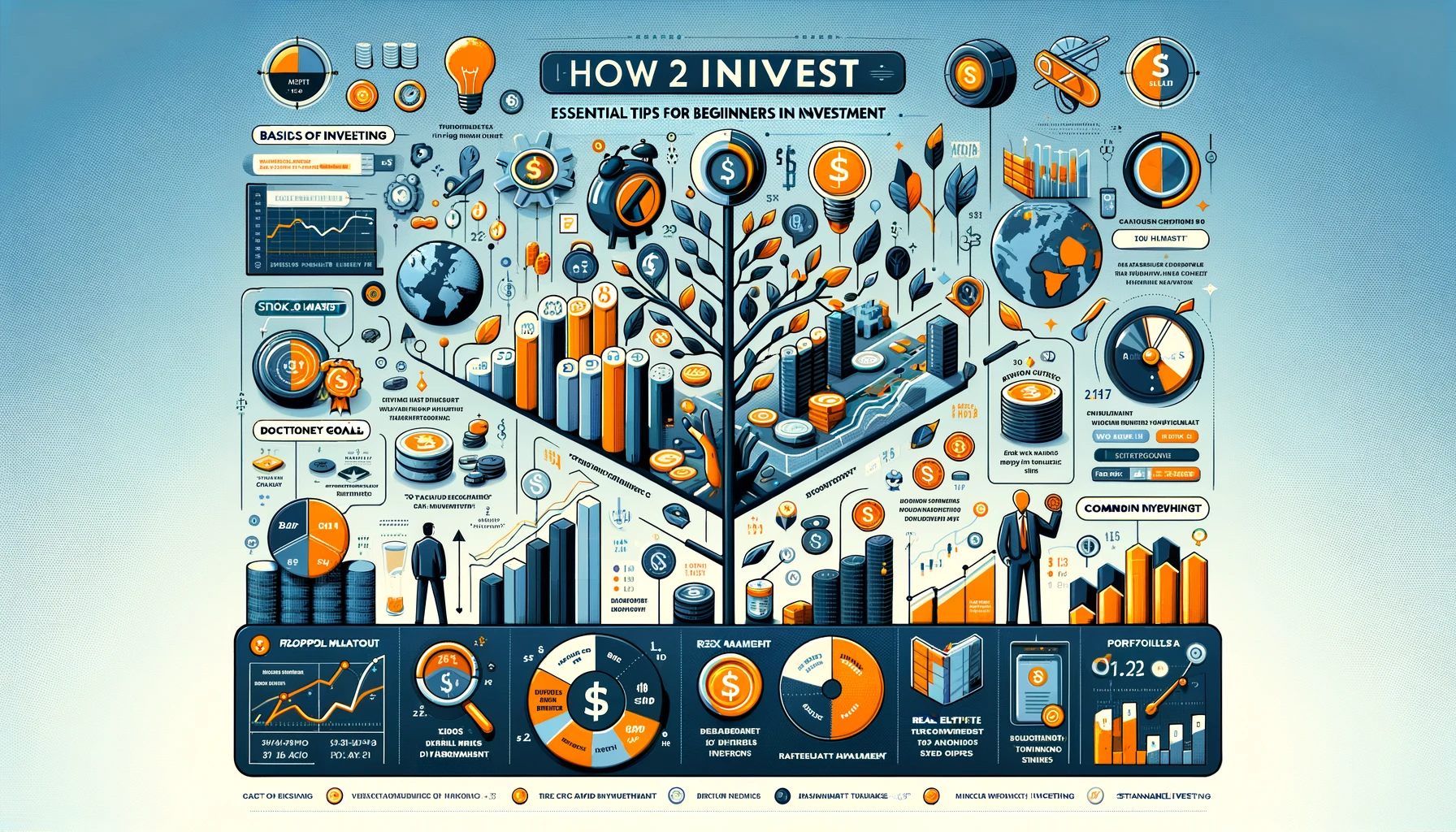Investing is an essential pathway to achieving financial independence and wealth accumulation. However, for many, the world of investment can seem labyrinthine and daunting. This comprehensive guide is designed to demystify the process and offer clear, practical advice for beginners. Whether you’re contemplating your first foray into the stock market, considering real estate, or curious about cryptocurrencies, this article will provide you with the foundational knowledge and strategies to start your investment journey.
Table of Contents
ToggleUnderstanding the Basics of Investing
The concept of investing is fundamentally about putting your money to work in various ventures with the expectation of growing your initial capital. There’s a diverse array of investment vehicles available, each with unique characteristics, risks, and benefits. These include stocks, which represent ownership in a company; bonds, essentially loans made to a company or government; mutual funds, which pool money from multiple investors to buy a portfolio of stocks or bonds; real estate investment; and more novel avenues like cryptocurrencies and precious metals. Understanding these options is the first step toward making informed investment decisions.
Setting Investment Goals
Before embarking on any investment, it’s crucial to establish clear, realistic goals. Are you investing to build a nest egg for retirement, save for a major purchase, or generate income? The timeframe for your investment goals will greatly influence your approach. Short-term investors might look for quicker, potentially higher-yield investments, albeit with higher risks, while long-term investors can afford to weather short-term market fluctuations for gradual, compounding gains. Equally important is understanding your risk tolerance. This self-assessment guides your investment choices and helps you build a portfolio that aligns with your comfort level regarding potential losses.
Starting with Stock Market Investing
The stock market is often the first stop for many new investors. Investing in stocks means buying a fraction of ownership in a company. The key to success in stock market investing is research. Beginners should focus on understanding fundamental analysis, which involves evaluating a company’s financial health, market position, competitors, and future growth prospects. It’s also critical to keep an eye on broader economic indicators and trends, as these can significantly impact stock prices. A diversified portfolio, spreading investments across various sectors and geographic regions, can also help mitigate risk.
Exploring Bonds and Mutual Funds
Bonds are a more stable investment option compared to stocks. When you buy a bond, you’re essentially lending money to an issuer (a corporation or government) in exchange for periodic interest payments and the return of the bond’s face value at maturity. Mutual funds offer a way to invest in a diversified portfolio of stocks, bonds, or other securities. They are managed by professionals who allocate the fund’s assets and attempt to produce capital gains for the fund’s investors. A balanced approach to bonds and mutual funds can provide both stability and growth potential for your portfolio.
Real Estate as an Investment Option
Real estate investment can be a lucrative avenue but requires more hands-on involvement compared to stocks or bonds. This can involve purchasing property to rent or sell at a profit. Real estate markets can offer stability and are often less volatile than stock markets. However, potential investors should be mindful of the additional responsibilities, like property management, and the illiquid nature of real estate compared to other investment types. Additionally, understanding the local property market, economic trends affecting real estate, and tax implications is vital for success in this area.
Diving into Cryptocurrency
Cryptocurrency investment is one of the more recent and volatile investment arenas. These digital or virtual currencies use cryptography for security and operate on decentralized networks based on blockchain technology. While they offer high potential returns, they also come with significant risk due to their nascent nature and market volatility. Potential investors should start with a clear understanding of blockchain technology, the specific cryptocurrency they’re considering (like Bitcoin or Ethereum), and be prepared for potentially drastic price swings.
Investing in Precious Metals
Precious metals like gold and silver have been investment staples for centuries. They are often considered safe-haven assets, retaining value and even appreciating during times of economic turbulence. Investing in precious metals can be done through buying physical bullion, coins, or indirectly through stocks in mining companies or ETFs (exchange-traded funds). While they provide a hedge against inflation and currency devaluation, precious metals do not offer interest or dividends and may not perform as well as other investments in a strong economy.
Building a Diverse Investment Portfolio
Diversification is a cornerstone of sound investment strategy. It involves spreading your investments across different asset classes (like stocks, bonds, real estate, and precious metals) to reduce risk. The idea is that when one market is down, another might be up, balancing your overall portfolio performance. For beginners, achieving diversification can be more accessible through mutual funds or ETFs, which inherently contain a mix of investments.
Risk Management in Investing
Effective risk management is crucial for successful investing. It’s not just about choosing the right assets but also about how you manage your portfolio. This includes setting stop-loss orders to limit potential losses, regularly reviewing and rebalancing your portfolio to align with your investment goals and risk tolerance, and staying informed about market changes and economic trends. Remember, all investments carry some degree of risk, and it’s important to invest only what you can afford to lose.
Tools and Resources for Investors
A wealth of tools and resources is available for investors, ranging from online trading platforms, mobile apps, financial news websites, and educational resources. Utilizing these tools can help you track market trends, perform stock analysis, manage your portfolio, and continue your financial education. Books on investment strategies, online courses, and webinars can also provide valuable insights and deepen your understanding of various investment topics.
Common Investing Mistakes to Avoid
Common mistakes among new investors include reacting to market volatility with panic selling, trying to time the market, investing based on hearsay or trends without proper research, and not diversifying their portfolio. Another frequent error is not reassessing investment goals and risk tolerance over time. Learning from these mistakes is crucial for long-term investment success.
Planning for Retirement through Investment
Investing can play a significant role in retirement planning. This often involves a long-term strategy, focusing on growth in the early years and gradually shifting to more stable, income-generating investments as retirement nears. Understanding the different retirement accounts available, such as 401(k)s and IRAs, and their respective tax advantages can significantly impact your retirement savings.
Sustainable and Impact Investing
For those who wish to align their investments with their ethical beliefs, sustainable and impact investing offers a compelling option. This approach focuses on investing in companies or funds that generate social or environmental good alongside financial returns. It’s gaining traction among investors who want their money to contribute to positive change in the world.
Conclusion
Investing is not just about growing wealth; it’s a journey of learning and adaptation. Starting with a solid understanding of various investment options, setting clear goals, and being mindful of risks can set you on a path to financial success. Remember, every investor’s journey is unique, and what works for one may not work for another. Stay informed, stay diversified, and most importantly, stay committed to your long-term goals.
FAQs
- How much money do I need to start investing?
- You can start investing with a relatively small amount of money. Many online brokers have no minimums to open an account, and some investments like stocks can be purchased in fractional shares.
- Is investing in the stock market safe?
- Investing in the stock market involves risk, including the potential loss of principal. However, with research, a well-planned strategy, and diversification, the stock market has historically provided solid returns over the long term.
- Should I invest in cryptocurrency?
- Cryptocurrency can be a high-reward investment, but it’s also highly volatile and risky. Only invest what you can afford to lose and ensure it’s part of a diversified investment strategy.
- How do I diversify my investment portfolio?
- Diversification involves spreading your investments across various asset classes. This can be achieved by investing in different types of stocks, bonds, real estate, and other assets, or through mutual funds and ETFs.
- How often should I check my investments?
- While it’s important to stay informed, obsessively checking your investments can lead to rash decisions. A long-term investment strategy benefits from regular, but not constant, monitoring and adjustments.

